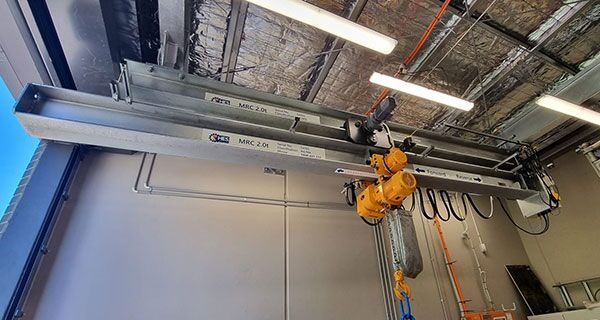
Monorail cranes are a practical and reliable solution for businesses that require repetitive movement, linear workflows, or efficient lifting in confined spaces. Unlike mobile or overhead cranes with complex paths, monorail cranes operate along a fixed track, offering predictable movement and controlled handling. When integrated effectively into a workspace, they reduce downtime, lower labour effort, and improve overall operational efficiency.
Consistent Movement Along a Fixed Path
One of the main advantages of a monorail crane is its predictable and fixed movement. Businesses that need to transfer loads between the same points repeatedly benefit from the consistent path provided by the overhead track. Unlike manual handling or mobile equipment, a monorail crane ensures that materials move smoothly from one station to another without interruptions. This reduces workflow bottlenecks, prevents unnecessary stops, and keeps production running at a steady pace.
Reducing Manual Handling and Physical Strain
Manual lifting and repositioning of heavy items are major contributors to worker fatigue and lost productivity. Monorail cranes take over repetitive lifting tasks, allowing staff to focus on skilled work instead of physically demanding movements. With the load controlled overhead, the risk of accidents, strain, or improper lifting techniques decreases. Teams can work more efficiently, and the overall safety of the workspace improves, which reduces downtime caused by injuries or errors.
Decluttering the Workspace
Workshops and production floors are often crowded with trolleys, forklifts, and temporary lifting equipment. This congestion can slow operations and increase the likelihood of errors. By moving lifting operations overhead, monorail cranes free up valuable floor space, allowing other equipment and staff to move more freely. A decluttered workspace leads to smoother workflows, fewer delays, and improved coordination among team members.
Simple and Fast Operation
Monorail cranes are designed for straightforward operation. The operator generally manages lifting, lowering, and forward movement along the track, which makes training simple and reduces the chances of operational errors. Unlike more complex systems, monorail cranes require fewer adjustments, meaning tasks can be completed faster and with greater consistency. For businesses that rely on speed and reliability, this simplicity directly translates into higher productivity.
Ideal for Repetitive Tasks
Many industrial processes involve repeated lifting cycles, such as moving parts along an assembly line, transferring materials to storage areas, or handling components during inspection and machining. Monorail cranes are ideal for these repetitive tasks because the fixed track ensures predictable load travel. The system reduces unnecessary decisions or extra handling steps, allowing staff to focus on tasks that require skill and attention. Over time, even small efficiencies gained from repetitive tasks add up to significant productivity improvements.
Lower Risk of Operational Delays
Downtime often occurs due to equipment adjustments, repairs, or the need for extra personnel during lifting. Monorail cranes reduce these risks because the system remains fixed overhead and follows a controlled path. With fewer moving parts to adjust and a predictable lifting route, the risk of unexpected interruptions is minimized. Reliable operation means businesses can plan and execute workflows with confidence, keeping production schedules on track.
Improved Workflow Planning
The fixed route of a monorail crane makes it easier to organize a workspace effectively. Benches, machines, storage areas, and tools can be positioned around the track to optimize material movement. Workers spend less time navigating obstacles or moving equipment out of the way, which reduces fatigue and supports a smoother workflow. Proper planning around a monorail system contributes to long-term efficiency and helps maximize the use of available space.
Final Thought
Monorail cranes are more than just lifting equipment they are workflow solutions that streamline operations, reduce downtime, and lower labour effort. By shifting lifting tasks overhead, simplifying load movement, and supporting repetitive workflows, these cranes help businesses maintain consistent productivity and operational reliability. For companies looking for practical, long-term solutions, HES Cranes provides monorail crane systems designed to meet real-world workflow needs while improving safety and efficiency.






